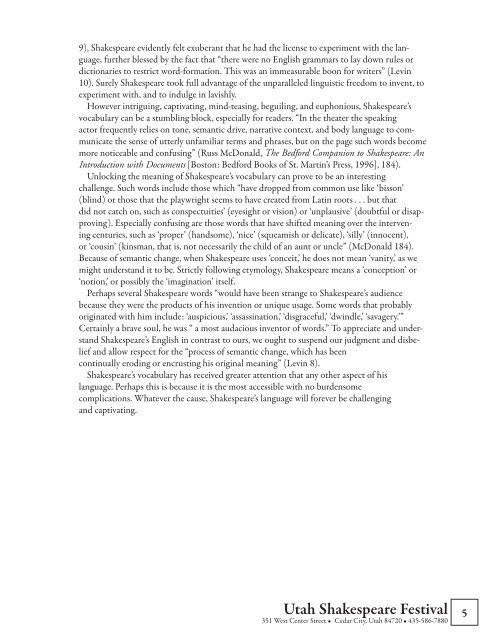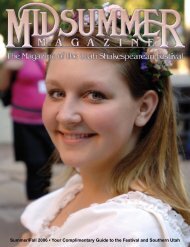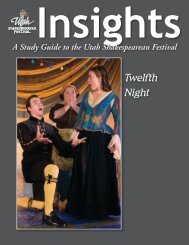Shakespeare: Words, Words, WordsBy S. S. Moorty“No household <strong>in</strong> <strong>the</strong> English-speak<strong>in</strong>g world is properly furnished unless it conta<strong>in</strong>scopies of <strong>the</strong> Holy Bible <strong>and</strong> of The Works of William Shakespeare. It is not always thoughtthat <strong>the</strong>se books should be read <strong>in</strong> maturer years, but <strong>the</strong>y must be present as symbols ofReligion <strong>and</strong> Culture” (G.B. Harrison, Introduc<strong>in</strong>g Shakespeare. Rev. & Exp. [New York:Pengu<strong>in</strong> Books, 1991], 11).We, <strong>the</strong> Shakespeare-<strong>the</strong>ater goers <strong>and</strong> lovers, devotedly <strong>and</strong> ritualistically watch <strong>and</strong> read <strong>the</strong>Bard’s plays not for excit<strong>in</strong>g stories <strong>and</strong> complex plots. Ra<strong>the</strong>r, Shakespeare’s language is a vitalsource of our supreme pleasure <strong>in</strong> his plays. Contrary to ill-conceived notions, Shakespeare’slanguage is not an obstacle to appreciation, though it may prove to be difficult to underst<strong>and</strong>Instead, it is <strong>the</strong> communicative <strong>and</strong> evocative power of Shakespeare’s language that is astonish<strong>in</strong>glyrich <strong>in</strong> vocabulary—about 29,000 words—strik<strong>in</strong>gly presented through unforgettable characters such as Hamlet, Macbeth, Lear, O<strong>the</strong>llo,Rosal<strong>in</strong>d, Viola, Iago, Shylock, etc.In <strong>the</strong> high school classroom, students perceive Shakespeare’s language as “Old English.”Actually Shakespeare’s l<strong>in</strong>guistic environment, experience, <strong>and</strong> exposure was, believe it or not,closer to our own times than to Chaucer’s, two hundred years earlier. Indeed, <strong>the</strong>history <strong>and</strong> development of <strong>the</strong> English language unfolds as follows: Old English, 449-1100;Middle English 1100-1500; <strong>and</strong> Modern English 1500-present. Shakespeare was firmly <strong>in</strong> <strong>the</strong>Modern English period.At <strong>the</strong> time Shakespeare wrote, most of <strong>the</strong> grammatical changes from Old <strong>and</strong> Middle Englishhad taken place; yet rigid notions about “correctness” had not yet been st<strong>and</strong>ardized <strong>in</strong> grammars.The past five centuries have advanced <strong>the</strong> cause of st<strong>and</strong>ardized positions for words; yet <strong>the</strong>flexible idiom of Elizabethan English offered abundant opportunities for Shakespeare’s l<strong>in</strong>guistic<strong>in</strong>ventiveness. Ideally it is reward<strong>in</strong>g to study several facets of Shakespeare’s English: pronunciation,grammar, vocabulary, wordplay, <strong>and</strong> imagery. The present overview will,however, be restricted to “vocabulary.”To Polonius’s <strong>in</strong>quisitive question “What do you read, my lord?” (Hamlet, 2.2.191) Hamletnonchalantly <strong>and</strong> <strong>in</strong>trigu<strong>in</strong>gly aptly replies: “Words, words, words” (2.2.192). This many-splendoredcreation of Shakespeare’s epitomizes <strong>the</strong> playwright’s own fasc<strong>in</strong>ation with <strong>the</strong> dynamicaspect of English language, however troubl<strong>in</strong>g it may be to modern audiences <strong>and</strong> readers.Shakespeare added several thous<strong>and</strong> words to <strong>the</strong> language, apart from impart<strong>in</strong>g new mean<strong>in</strong>gs toknown words. At times Shakespeare could teas<strong>in</strong>gly employ <strong>the</strong> same word for different shadesof thought. Barowne’s s<strong>in</strong>gle l<strong>in</strong>e, “Light, seek<strong>in</strong>g light, doth light of light beguile” (Love’sLabour’s Lost, 1.1.77), as Harry Lev<strong>in</strong> <strong>in</strong> his General Introduction to The Riverside Shakespeare(9) expla<strong>in</strong>s, “uses ‘light’ <strong>in</strong> four significations: <strong>in</strong>tellect, seek<strong>in</strong>g wisdom, cheats eyesight out ofdaylight.”Ano<strong>the</strong>r <strong>in</strong>stance: O<strong>the</strong>llo as he enters his bedroom with a light before he smo<strong>the</strong>rs his dear,<strong>in</strong>nocent Desdemona soliloquizes: “Put out <strong>the</strong> light, <strong>and</strong> <strong>the</strong>n put out <strong>the</strong> light” (O<strong>the</strong>llo,5.2.7) Here ‘light’ compares <strong>the</strong> light of O<strong>the</strong>llo’s lamp or torch to Desdemona’s ‘light’ of life.In both <strong>in</strong>stances, <strong>the</strong> repeated simple ord<strong>in</strong>ary word carries extraord<strong>in</strong>ary shades of mean<strong>in</strong>g.“Usually such a tendency <strong>in</strong> a Shakespeare play <strong>in</strong>dicates a more or less conscious <strong>the</strong>matic<strong>in</strong>tent.” (Paul A. Jorgensen, Redeem<strong>in</strong>g Shakespeare’s Words [Berkeley <strong>and</strong> Los Angeles;University of California Press, 1962], 100).Liv<strong>in</strong>g <strong>in</strong> an age of <strong>the</strong> “gr<strong>and</strong>iose humanistic confidence <strong>in</strong> <strong>the</strong> power of <strong>the</strong> word” (Lev<strong>in</strong>4<strong>Utah</strong> Shakespeare Festival351 West Center Street • Cedar City, <strong>Utah</strong> 84720 • 435-586-7880
9), Shakespeare evidently felt exuberant that he had <strong>the</strong> license to experiment with <strong>the</strong> language,fur<strong>the</strong>r blessed by <strong>the</strong> fact that “<strong>the</strong>re were no English grammars to lay down rules ordictionaries to restrict word-formation. This was an immeasurable boon for writers” (Lev<strong>in</strong>10). Surely Shakespeare took full advantage of <strong>the</strong> unparalleled l<strong>in</strong>guistic freedom to <strong>in</strong>vent, toexperiment with, <strong>and</strong> to <strong>in</strong>dulge <strong>in</strong> lavishly.However <strong>in</strong>trigu<strong>in</strong>g, captivat<strong>in</strong>g, m<strong>in</strong>d-teas<strong>in</strong>g, beguil<strong>in</strong>g, <strong>and</strong> euphonious, Shakespeare’svocabulary can be a stumbl<strong>in</strong>g block, especially for readers. “In <strong>the</strong> <strong>the</strong>ater <strong>the</strong> speak<strong>in</strong>gactor frequently relies on tone, semantic drive, narrative context, <strong>and</strong> body language to communicate<strong>the</strong> sense of utterly unfamiliar terms <strong>and</strong> phrases, but on <strong>the</strong> page such words becomemore noticeable <strong>and</strong> confus<strong>in</strong>g” (Russ McDonald, The Bedford Companion to Shakespeare: AnIntroduction with Documents [Boston: Bedford Books of St. Mart<strong>in</strong>’s Press, 1996], 184).Unlock<strong>in</strong>g <strong>the</strong> mean<strong>in</strong>g of Shakespeare’s vocabulary can prove to be an <strong>in</strong>terest<strong>in</strong>gchallenge. Such words <strong>in</strong>clude those which “have dropped from common use like ‘bisson’(bl<strong>in</strong>d) or those that <strong>the</strong> playwright seems to have created from Lat<strong>in</strong> roots . . . but thatdid not catch on, such as conspectuities’ (eyesight or vision) or ‘unplausive’ (doubtful or disapprov<strong>in</strong>g).Especially confus<strong>in</strong>g are those words that have shifted mean<strong>in</strong>g over <strong>the</strong> <strong>in</strong>terven<strong>in</strong>gcenturies, such as ‘proper’ (h<strong>and</strong>some), ‘nice’ (squeamish or delicate), ‘silly’ (<strong>in</strong>nocent),or ‘cous<strong>in</strong>’ (k<strong>in</strong>sman, that is, not necessarily <strong>the</strong> child of an aunt or uncle” (McDonald 184).Because of semantic change, when Shakespeare uses ‘conceit,’ he does not mean ‘vanity,’ as wemight underst<strong>and</strong> it to be. Strictly follow<strong>in</strong>g etymology, Shakespeare means a ‘conception’ or‘notion,’ or possibly <strong>the</strong> ‘imag<strong>in</strong>ation’ itself.Perhaps several Shakespeare words “would have been strange to Shakespeare’s audiencebecause <strong>the</strong>y were <strong>the</strong> products of his <strong>in</strong>vention or unique usage. Some words that probablyorig<strong>in</strong>ated with him <strong>in</strong>clude: ‘auspicious,’ ‘assass<strong>in</strong>ation,’ ‘disgraceful,’ ‘dw<strong>in</strong>dle,’ ‘savagery.’”Certa<strong>in</strong>ly a brave soul, he was “ a most audacious <strong>in</strong>ventor of words.” To appreciate <strong>and</strong> underst<strong>and</strong>Shakespeare’s English <strong>in</strong> contrast to ours, we ought to suspend our judgment <strong>and</strong> disbelief<strong>and</strong> allow respect for <strong>the</strong> “process of semantic change, which has beencont<strong>in</strong>ually erod<strong>in</strong>g or encrust<strong>in</strong>g his orig<strong>in</strong>al mean<strong>in</strong>g” (Lev<strong>in</strong> 8).Shakespeare’s vocabulary has received greater attention that any o<strong>the</strong>r aspect of hislanguage. Perhaps this is because it is <strong>the</strong> most accessible with no burdensomecomplications. Whatever <strong>the</strong> cause, Shakespeare’s language will forever be challeng<strong>in</strong>g<strong>and</strong> captivat<strong>in</strong>g.<strong>Utah</strong> Shakespeare Festival351 West Center Street • Cedar City, <strong>Utah</strong> 84720 • 435-586-78805
















